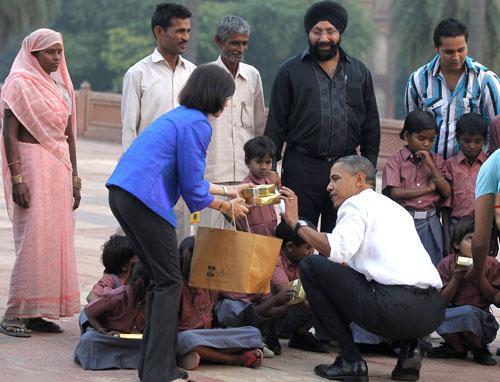Advertisement
Exploring the India-U.S. Partnership
ResumeThe President has wrapped up his big visit — we look at the real stakes in the U.S.-India relationship.

The president danced in India – almost Bollywood-style. He hugged India’s prime minister Manmohan Singh, a lot. He paid homage to Mahatma Gandhi.
But President Obama’s just-completed big trip to India was no sentimental journey. In the calculus of 21st century power, India is more than “emerging” as a big deal. It’s an economic powerhouse and a geopolitical counterweight to China. It's also an Afghan near-neighbor and a democracy.
A “natural ally” some call it. But it hasn’t always been. We look at America’s new “best friend forever," maybe: India.
-Tom Ashbrook
Guests:
Jake Tapper joins us from Jakarta, Indonesia. He is senior White House correspondent for ABC News and is traveling with President Obama.
Nicholas Burns, Under Secretary of State for Political Affairs from 2005 to 2008, during which time he led negotiations on the U.S.-India Civil Nuclear Agreement. He is former U.S. Ambassador to NATO, and he worked on the National Security Council under President Clinton. He is currently director of the Future of Diplomacy Project for the Programs on the Middle East and on India and South Asia, and a professor of diplomacy and international politics at Harvard’s Kennedy School. Read the new report he co-authored for the Center for a New American Security, "Natural Allies" (PDF).
Sumit Ganguly joins us from New Delhi, India. He is a professor of political science and holds the chair in Indian Cultures and Civilizations at Indiana University in Bloomington. He is currently in India as a Distinguished Visiting Fellow at the Institute of Defence Studies and Analyses in New Delhi. He is the co-author, most recently, of "Fearful Symmetry: India and Pakistan Under the Shadow of Nuclear Weapons" and "More Than Words: U.S.-India Strategic Cooperation Into the Twenty-First Century."
Eswar Prasad, professor of trade policy at Cornell University, senior fellow at the Brookings Institution, and former head of the International Monetary Fund’s China Division.
This program aired on November 9, 2010.